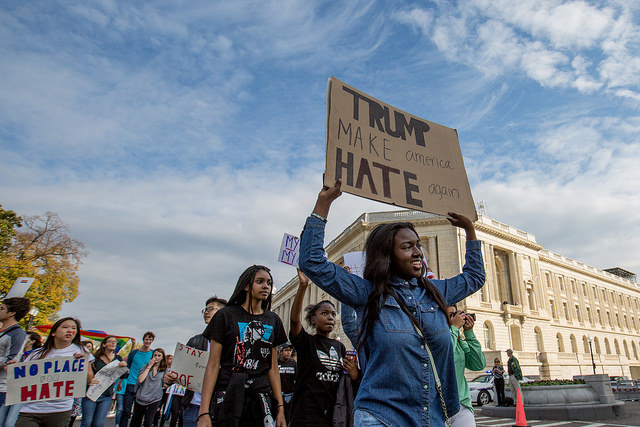Donald Trump represents such a threat to what reasonable people hold dear, it’s hard not to get unhinged just thinking about his presidency. For a start, his election sets back world efforts to address climate change for four years minimum.
Women who fought for reproductive rights fear his power to nominate anti-choice Supreme Court justices. The LGBTQ community feel the beginnings of renewed persecution. Undocumented workers and their families now live in terror of discovery and deportation.
Seldom if ever has an American presidential candidate been as ill prepared for office or carried on in such a personally offensive manner as Donald Trump. Calling him out for his xenophobia, sexism, bigotry and Mussolini potential is not good enough, however.
For Dr. Martin Luther King, the first step in preparing nonviolent resistance was “collection of the facts.” This is what the U.S. Democratic Party needs to be doing in response to the victory of Donald Trump.
The Clinton team won the popular vote running an anti-Trump campaign. It didn’t matter. Draw a diagonal line from Florida in the southeast to Idaho in the northwest, and the Republican candidate won every state attacking the fat cats. His own billionaire status only served to legitimate him. He was someone with big money confirming that people were being done in by big money.
After losing nearly 700 seats at the federal and state levels since 2008, the Democratic Party needs to recognize its shortcomings go beyond defeat in the 2016 presidential election.
The Wall St. collapse of 2007-08 provided the context for the two great insurgencies that emerged in the presidential primaries.
Bernie Sanders denounced the unacceptable control of U.S. party politics by the wealthy. An American candidate for office was not so much elected as “hired” by large corporate donors.
Companies so empowered through political investments (bribes, really) rigged the economy against working people with the active support of elected officials.
Sanders said the U.S. needs a political revolution. His presidential campaign created one among young people and many disaffected Democrats.
Only the connivance of senior party officials prevented him from securing the nomination.
Last August, few gave the Republican nominee any chance at the presidency. His new campaign chief, the much maligned Steve Bannon, disagreed. Americans have been done in by crony capitalism, said the former Goldman Sachs investment banker, now strategic adviser to the president-elect.
Insolvent banks got bailed out with billions of public money. Then, the bank boards paid bank executives that fell down on the job bonuses with government money.
Trump mounted an attack on the American establishment, Republican and Democrat alike.
Hillary Clinton represented the status quo; she was paid outrageous fees to speak at private Wall St. gatherings.
People in traditionally Democratic states such as Pennsylvania, Michigan and Wisconsin were looking for change.
Just enough voters in those three states voted Trump for him to win the Electoral College. A shift of 55,000 votes in those three rust belt states, and he would have lost.
Trump had no ground game to match the Democrats’ “get out the vote” efforts. But he promised jobs and retribution against corporate America, and his voters got themselves out.
Meanwhile, the Democrats who stayed home let Trump win the election.
Since the advent of the television era in 1960, the year John F. Kennedy was elected, American presidential elections have routinely gone to the candidate who spent the most money on paid advertising. Trump was outspent by Clinton, but it didn’t matter.
A natural TV performer with many years of experience, Trump obtained free coverage on cable news channels and in mainstream media, laughingly called “earned” TV coverage.
NYU Professor of Liberal Studies Christian Parenti observed Trump closely and concluded: “he personified the cut-up Dada-style assault on coherent thought that is the essence of television.”
The post-truth candidate Donald Trump emotionally connected with regular Americans. Without Obama, the rainbow coalition that first came together behind the 1984 Jesse Jackson insurgency failed to win the White House for the Democratic Party.
Targeted messaging of voters identified by gender, income, age, education, region and minority or non-minority status, worked in the past for Democrats, and may work again.
Trump had a powerful tale to tell desperate and affluent people alike, while the Democrats had no definable economic narrative.
If the Democrats expect to recover, that needs to change.
Duncan Cameron is former president of rabble.ca and writes a weekly column on politics and current affairs.
Photo: Lorie Shaull/flickr



